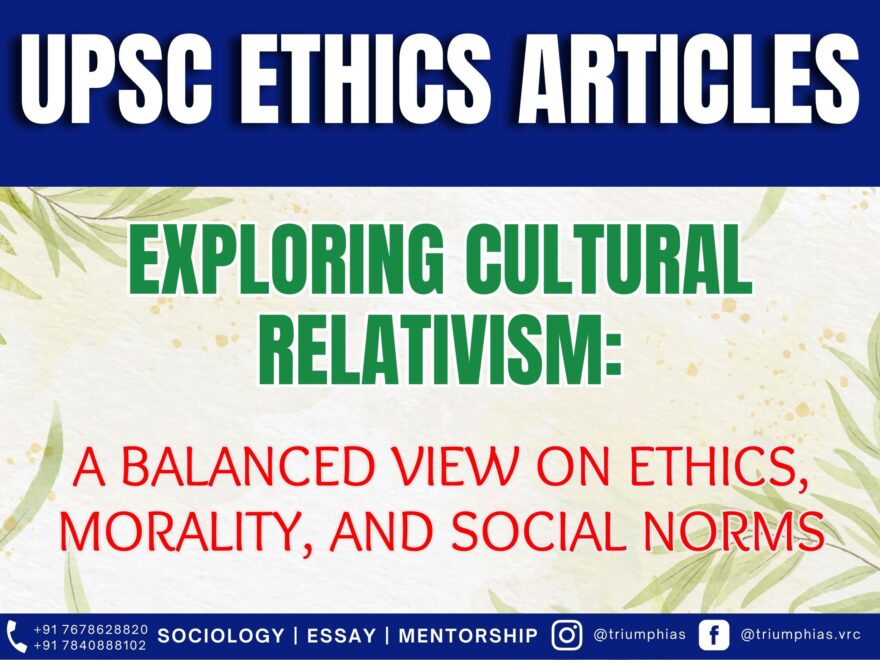Cultural Relativism
(Relevant for Ethics, Integrity and Aptitude)

Cultural relativism
Cultural relativism entails comprehending a culture within its own context without evaluating it based on the values of one’s own culture. Embracing cultural relativism results in the belief that no culture holds inherent superiority over another culture, especially concerning moral frameworks, legal systems, political structures, and more.
According to the theory of cultural relativism, no society is better than another, they are simply different.
- This claim has several corollaries, including: different groups have different moral standards, there is no unbiased way to judge how well or bad these standards are, and people studying cultures should explain them rather than make comparisons to their own.
- According to moral relativism, what is accepted as right in one society is always right in that same culture. Some people believe that there is no real way to determine what is right and evil, which makes cultural relativism weaker.
- Although there has been discussion over cultural relativism, notably among philosophers, anthropological and sociological research has led to a consensus among social scientists that it is real.
- Ethnocentrism, which encourages people to see the world through the prism of their own culture, is in opposition to cultural relativism.
- The idea is sometimes used in research to avoid cultural bias and avoid judging another culture based on the standards of one’s own.
- Because of this, cultural relativism has been seen as a defense against ethnocentrism.
Significance of Cultural Relativism:
- Cultural relativism revolves around the notion that cultural norms and values derive their significance from the specific social milieu in which they exist.
- This principle is rooted in the belief that an absolute standard of what is right or wrong doesn’t exist.
- Consequently, every determination of morality and judgment about what is ethical or unethical is shaped individually within each society.
- The concept of cultural relativism also implies that ethical viewpoints are influenced by the particular cultural lens of each individual.
- In a comprehensive interpretation of cultural relativism, it aims to foster an appreciation for cultural practices that may seem unfamiliar to other societies. As awareness of global cultural diversity has grown, doubts regarding objective moral norms have arisen.
- This has led proponents of cultural relativism to conclude that no moral principles transcend cultural boundaries, making it inappropriate to judge one culture’s standards using the values of another culture.
Problems with Cultural Relativism:
- Cultural relativism gives rise to several objectionable consequences. For instance: A society might attempt to marginalize or eradicate a minority group.
- This cannot be deemed acceptable solely based on the reasoning that it aligns with that society’s cultural values. It promotes the notion that disparities should be resolved by the majority and considered an inherent aspect of the culture.
- If a culture practices acts such as slavery or infanticide, these actions could be seen as falling short of meeting the universal moral standard.
Cultural relativism presents the challenge to ethics as universal standards of right or wrong, as it comes from the claim that moral judgments are relative to the individual or particular societies and are not universally applicable.
To master these intricacies and fare well in the Sociology Optional Syllabus, aspiring sociologists might benefit from guidance by the Best Sociology Optional Teacher and participation in the Best Sociology Optional Coaching. These avenues provide comprehensive assistance, ensuring a solid understanding of sociology’s diverse methodologies and techniques.
Best Sociology Optional Teacher, Best Sociology Optional Coaching, Sociology Optional Syllabus, Cultural Relativism, Ethics, Morality, Social Norms, Ethnocentrism, Cultural Diversity, UPSC Sociology Optional, Philosophical Debates, Anthropology, Moral Frameworks, Political Structures, Cultural Relativism, Cultural Relativism, Cultural Relativism, Cultural Relativism, Cultural Relativism,

Choose The Best Sociology Optional Teacher for IAS Preparation?
At the beginning of the journey for Civil Services Examination preparation, many students face a pivotal decision – selecting their optional subject. Questions such as “which optional subject is the best?” and “which optional subject is the most scoring?” frequently come to mind. Choosing the right optional subject, like choosing the best sociology optional teacher, is a subjective yet vital step that requires a thoughtful decision based on facts. A misstep in this crucial decision can indeed prove disastrous.
Ever since the exam pattern was revamped in 2013, the UPSC has eliminated the need for a second optional subject. Now, candidates have to choose only one optional subject for the UPSC Mains, which has two papers of 250 marks each. One of the compelling choices for many has been the sociology optional. However, it’s strongly advised to decide on your optional subject for mains well ahead of time to get sufficient time to complete the syllabus. After all, most students score similarly in General Studies Papers; it’s the score in the optional subject & essay that contributes significantly to the final selection.
“A sound strategy does not rely solely on the popular
Opinion of toppers or famous YouTubers cum teachers.”
It requires understanding one’s ability, interest, and the relevance of the subject, not just for the exam but also for life in general. Hence, when selecting the best sociology teacher, one must consider the usefulness of sociology optional coaching in General Studies, Essay, and Personality Test.
The choice of the optional subject should be based on objective criteria, such as the nature, scope, and size of the syllabus, uniformity and stability in the question pattern, relevance of the syllabic content in daily life in society, and the availability of study material and guidance. For example, choosing the best sociology optional coaching can ensure access to top-quality study materials and experienced teachers. Always remember, the approach of the UPSC optional subject differs from your academic studies of subjects. Therefore, before settling for sociology optional, you need to analyze the syllabus, previous years’ pattern, subject requirements (be it ideal, visionary, numerical, conceptual theoretical), and your comfort level with the subject.
This decision marks a critical point in your UPSC – CSE journey, potentially determining your success in a career in IAS/Civil Services. Therefore, it’s crucial to choose wisely, whether it’s the optional subject or the best sociology optional teacher. Always base your decision on accurate facts, and never let your emotional biases guide your choices. After all, the search for the best sociology optional coaching is about finding the perfect fit for your unique academic needs and aspirations.
To master these intricacies and fare well in the Sociology Optional Syllabus, aspiring sociologists might benefit from guidance by the Best Sociology Optional Teacher and participation in the Best Sociology Optional Coaching. These avenues provide comprehensive assistance, ensuring a solid understanding of sociology’s diverse methodologies and techniques. Sociology, Social theory, Best Sociology Optional Teacher, Best Sociology Optional Coaching, Sociology Optional Syllabus.
Best Sociology Optional Teacher, Sociology Syllabus, Sociology Optional, Sociology Optional Coaching, Best Sociology Optional Coaching, Best Sociology Teacher, Sociology Course, Sociology Teacher, Sociology Foundation, Sociology Foundation Course, Sociology Optional UPSC, Sociology for IAS,
Follow us :
🔎 https://www.instagram.com/triumphias
🔎https://www.youtube.com/c/TriumphIAS
https://t.me/VikashRanjanSociology
Find More Blogs
|
Scope of the subject and comparison with other social sciences |
|||
|
|
|
|
Modernity and social changes in Europe |


One comment